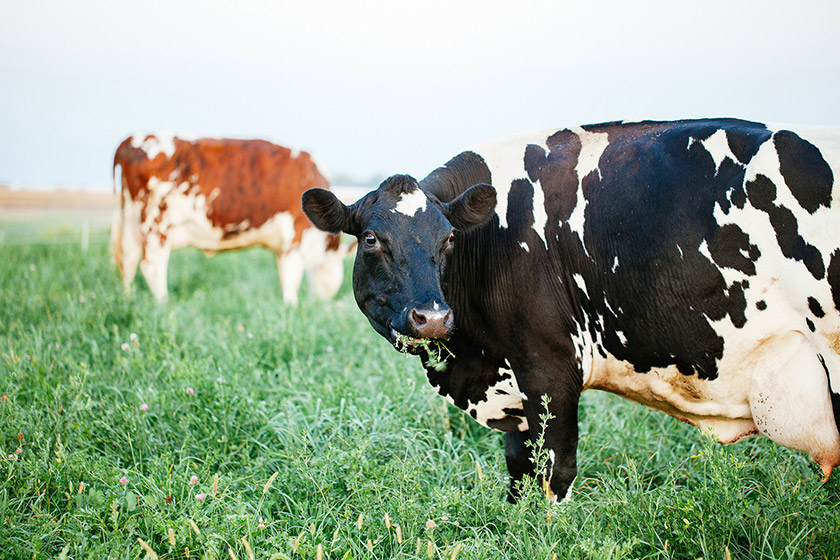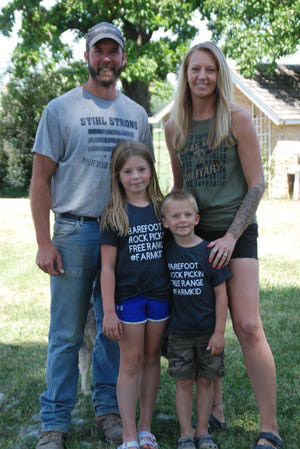Family converts to organic dairy production to create a pathway for next generation

Published: July 31, 2023
Category: Organic News
By Jan Shepel, Correspondent
From the hill overlooking Paoli and the surrounding hills in southern Wisconsin, fifth-generation dairy farmer Darren Eichelkraut sees the same view that four previous generations looked out on when they got up to milk cows in the morning. Breezy View Dairy has been in the family since 1921.
Last year the Eichelkraut’s celebrated the farm’s century mark by cleaning out the barn’s haymow and throwing a big party, inviting the whole neighborhood. The Covid pandemic delayed the celebration for two years.
What has made this farm a success for Darren and his wife Nicky, is the conversion of the farm to organic production. Darren’s parents Harold “Junior” and Jeannie began the process that led to organic certification so Darren could plan a future on the farm. At the time, Darren was working as a carpenter, framing houses and then as a helpful hardware store man. But he felt the pull of the farm.
“I decided I wanted to come back to the farm but a 50-cow conventional operation just wasn’t going to work. A lot of our dairy farming neighbors were getting bigger so the competition for land was really intense,” he said. There is also competition for land purchases in his area by investors.
“Mom and Dad thought about it and decided to begin the three-year organic certification in 2006 and then the economy tanked,” Darren said. The expense of converting the farm to organic coupled with the “rock-bottom” prices for conventional farm milk at that time almost made his dad throw in the towel.
“Mom convinced him to stick with it and now everybody’s glad he did. Once the organic certification came through, he said he paid off more debt in a couple of years than he thought possible,” Darren said. “I don’t think Mom has gotten enough credit for staying the course.”
Though they talked to several other organic milk companies, the family were extremely happy to contract their milk to Westby Cooperative Creamery in Westby, WI the day they achieved their organic certification. Looking back, that relationship has created the financial footing the family had been hoping for, Darren said.
“We have been extremely happy with Westby.” The creamery has been paying them $30 per hundredweight “for a long time”. For him, one of the benefits of this kind of farmer/creamery relationship is that it eliminates the roller coaster of prices experienced by most farmers in the conventional market.
Darren and Nicky have a herd of 52 cows (including dry cows) that they milk in the traditional red-painted barn on the farm. The heifers are raised on land across the road where Darren’s parents built a new house a few years ago and where the family already has a heifer barn with pasture to accompany it.

Darren Eichelkraut, his wife Nicky, and children Aria, 7, and Merik, 5
The farming operation includes 100 acres that Darren and Nicky own and 150 acres of woodland, cropland and pasture that his parents own. They also rent 80 acres from a neighbor.
“What makes it nice is that everything is adjacent,” he said. “It’s all right here and I’m able to raise all the feed we need for our herd.” Organic production requires that cows get a significant amount of their nutrition from grazing and the fact that the land is all together makes that an easier task.
Darren has 100 acres in pasture at any given time and says that none of his pastures are “permanent” – he rotates everything in and out of pasture and the crops he grows.
There are currently 110 acres in hay (he aims for a 50:50 grass and alfalfa blend). In his pastures he strives for a “salad bar” with a variety of grasses along with red and white clovers.
The first crop of hay is all round-baled and wrapped with an in-line wrapper. Any straw he produces and second and third crop hay are baled with his two small-square balers. When the cows are in the barn over the winter months, he likes having the option to throw dry hay down the chute to feed them.
But he also has another option. When Eichelkraut invested in the round baler and wrapper, he also bought an implement that allows him to feed the wrapped, baled hay in front of the cows in the barn. Another implement allows him to feed the “balage” out in the fields.
Eichelkraut said that if drought diminishes his pastures too much this summer, he may have to begin rolling out balage for the cows.
“I cut way back on row crops and how much high-moisture corn I put up,” he said. As he learned how to manage his herd and his fields organically, Eichelkraut says the cows refused high moisture corn more than he liked to see, so he looked for something else that they preferred. He began growing triticale – a rye/wheat cross for grain. “They want to eat that much more,” he said. “And it makes great straw.”
Eichelkraut still grows corn and harvests it for high-moisture feed and some as dry shell corn so he can make his own calf and heifer feed. Triticale is planted behind his corn. Then he plants his direct seeding of hay behind the triticale.
Well-kept heifers
One big advantage of having the heifer facility and pasture on his parents’ land across the road is that they are always under a watchful eye. The heifer barn is also big enough that he can raise more heifers than he needs as replacements. When he needs to, he can sell heifers. If it doesn’t rain soon and replenish the pastures, Eichelkraut may be forced to sell more heifers.
Some of the cattle are crossbreds that include Montbelliard genetics, a dual-purpose dairy and beef breed that tent to grow large. That trait was advantageous when he recently sold a group of heifers. Though they were good dairy heifers and were all pregnant, buyers claimed them for the red-hot beef market with the largest, a Montbelliard crossbred, weighing in at 1,440 pounds. She brought a bid of $1.60 per pound – a smidge over $2,300. The other heifers in the group brought no less than $1.20 a pound.
When he has cull cows, Eichelkraut has a deal with a new restaurant down the road in Paoli. He feeds the outgoing cows for two or three extra months and names his price to Seven Acre Dairy. Prem Meats is hired to come and harvest the animals there on the farm. The chef then uses their organic beef on the menu. “As a farmer it was kind of a shock to have someone ask me what I need to get for something,” he said. “And they are making some prime dishes from those cull cows.”
Dairy genetics
When he started, the herd was all Holstein but Eichelkraut has introduced Montbelliard, Norwegian Red and Jersey genetics, breeding for health traits along with good feet and legs. He plans to add Normande genetics to his herd.
Not growing up farming organically, Eichelkraut had to get up to speed on the practices and products that would be permitted and how they would fit into his farming operation. Lacking neighbors with organic farming experience, he leaned heavily on the MOSES conference in La Crosse and other seminars, learning with trial and error.
He found they could spray a light mist of mineral oil over the cows to keep flies at bay. For mastitis, he’s used some herbal concoctions.
The cows are fed 12 pounds of grain each day all year ‘round, he said. “That seems to be a good number. The cows make 50 to 55 pounds of milk per day, maybe in the 60s when they get on spring pasture. I don’t feed any protein supplement. Mineral is the only thing I buy,” he said.
Eichelkraut mixes feed for the calves and heifers using a roller/mixer mill. Calves start out in the barn, then are raised in pens in a calf shed and later transferred to grass by the time they are four months old.
Heifers are rotated on their pasture paddocks every week while cows graze their paddocks for 12 hours. “They are never in a field for more than two days, and if I have to clip pastures, I try to do that only once per year.”
Managing weeds
Managing weeds can be a problem on organic operations. Eichelkraut is not opposed to pulling weeds by hand. He’s also used other strategies. When giant ragweed took over a section of his cornfield, he fenced it off and let the heifers graze. “My neighbors wondered what I was doing, letting heifers in the corn but they really cleaned everything up.”
Even before the farm went organic, cultivating was a big part of their family’s farming practice. It’s even more important now. While growing up, Eichelkraut says his dad was not opposed to using herbicides. However, it was not the first line of defense. “He didn’t rely on a lot of chemical inputs to farm the land.”
Some organic weed control practices engage the cattle to do the work. Eichelkraut uses a shade umbrella on wheels that is moved into various pasture paddocks with the cows. The device is strategically placed where weed pressure is the heaviest.
Without beneficial rains to water his pastures, Eichelkraut may resort to using the round bales in a field for the cows. If that happens, he will place them in a field where he plans to plant corn next year. That will take care of weeds and fertilize the ground, he said.
Unlike some grazers and organic farmers, Eichelkraut has a full line of machinery, some of it was on the farm under his Dad’s management, and some he has replaced or purchased.
Darren and Nicky have been married almost 10 years and she recently left her off-farm job to be home on the farm with her husband and their kids Aria, 7 and Merik, 5. Nicky is in charge of milking the cows morning and night.
When we visited under the shade of a giant walnut tree between the barn and house, the children were wearing T-shirts emblazoned with the saying: “barefoot, rock-pickin’, free-range farm kids.”
Eichelkraut says that in the beginning, farming organically was “strictly a business decision, but once we farmed that way and seeing the soil, the animals and the crops, it’s a conscious mentality, a philosophy. There are a lot of things I’d never go back to.
“I don’t think we’d be here on the farm if we hadn’t gone organic,” the Paoli farmer added. “It seems like the less I do, the more profitable I am.”
Reprinted with permission of Wisconsin Farmer
To view source article, visit: https://www.wisfarmer.com/story/news/2023/07/05/farmer-i-wouldnt-be-here-on-the-farm-if-we-says-he-wouldnt-be-farming-today-if-he-hadnt-gone-organic/70376731007/
Organic & Non-GMO Insights August 2023




